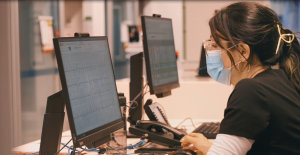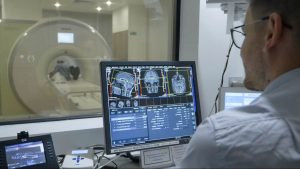The CALHN Clinical Immunology and Allergy Team are looking for people with hereditary angioedema (HAE) to participate in a study to help increase understanding of this rare disease.
HAE is a genetic condition caused by deficiency or dysfunction of the C1 inhibitor protein (C1-INH), which causes recurrent attacks of angioedema throughout life. In some cases there are triggers, but attacks often occur unpredictably at random.
With fewer than 30 known cases in South Australia, Central Adelaide is conducting a statewide study in a bid to identify the prevalence of HAE in this state and its unmet needs.
The condition causes swelling under the skin in different areas, which is disabling, debilitating and potentially fatal:
- hands, feet and genitals, which can cause inability to carry out work and daily functions
- face, where swelling is unsightly and uncomfortable
- intestines, causing acute abdominal attacks that can last for days, and if untreated, lead to missing work, and sometimes hospital attendance, occasionally resulting in unnecessary surgery for acute abdomen.
- tongue, throat and larynx, which can cause asphyxiation and may be fatal if not treated early.
Working with a team of specialists, Dr William Smith is leading the project, and hopes to uncover other possible patients with the condition.
“The aim of the project is to establish the full picture of HAE in South Australia, including identifying as many people as possible for studies, which is why we are asking for assistance to help us identify potential patients.”
“By understanding the landscape, this should help individual patients and the HAE community by outlining the impact of the condition, and identifying unmet needs.”
The study is searching for any community members either diagnosed but not known to the team, or undiagnosed.
If you have patients who have HAE but haven’t seen an immunologist or who have a family history of angioedema, or who have recurrent angioedema unresponsive to antihistamines, please get in contact. Community members with HAE are also encouraged to get in touch.
The grant has been awarded from the Allergy and Immunology Foundation of Australasia (AIFA).
Contact
The team is led by Dr William Smith, with colleagues Dr Pravin Hissaria, Dr Adriana Le, Dr Alex Troelnikov, and Research Officer Karen Milburn. You can reach them via phone on 7074 2880, or email as follows:
- Dr William Smith william.smith@sa.gov.au
- Karen Milburn RN karen.milburn@sa.gov.au
How to identify possible HAE
The condition is autosomal dominant, so it may occur in several members of the family including the extended family, and children of sufferers of HAE have a 50% chance of having the condition. Some patients have a new genetic variant, therefore have no family history.
Attacks of angioedema typically do not respond to adrenaline or corticosteroids, and cannot be prevented by taking regular antihistamine.
GPs can order the C4 test (complement factor 4), where the level is almost always low, particularly taken during or shortly after an attack, and the diagnosis is confirmed by measuring C1-INH functional level.
The aim of HAE treatment is to suppress angioedema attacks entirely, or to provide a safe and rapidly effective treatment to relieve attacks when they occur.”



